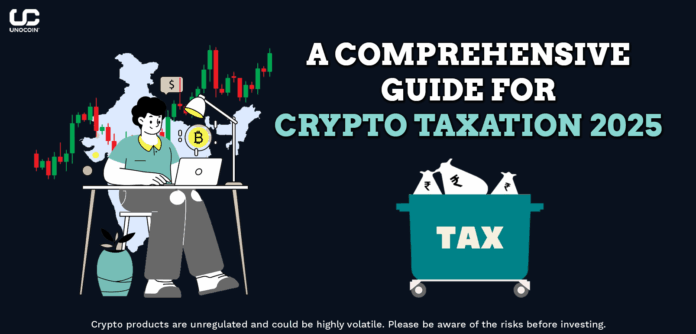With the rising popularity of cryptocurrencies in India, the government has stepped in to regulate and monitor digital asset transactions. If you’re an Indian crypto investor or trader in 2025, understanding the tax implications is no longer optional—it’s essential. Here’s a comprehensive breakdown to help you navigate crypto taxation in India this year.
What Qualifies as a Virtual Digital Asset (VDA)?
Under Section 2(47A) of the Income Tax Act, VDAs include:
- Cryptocurrencies (like Bitcoin, Ethereum, Solana, etc.)
- NFTs (Non-Fungible Tokens)
- Other digital assets notified by the government
This means whether you’re trading, gifting, or holding crypto—tax rules apply.
Key Tax Provisions for Crypto in 2025
1. Flat 30% Tax on Gains
Any income earned from the transfer of VDAs is taxed at a flat 30% rate. This is applicable to all gains, regardless of your income tax slab.
Example:
You buy Bitcoin at ₹1,00,000 and sell it for ₹1,50,000.
Profit = ₹50,000 → Tax = ₹15,000
2. No Deductions (Except Cost of Acquisition)
You cannot claim deductions for transaction fees, internet costs, mining costs, or losses against other incomes.
The only deduction allowed is the cost of acquiring the asset.
3. 1% TDS on Transfers (Section 194S)
Every time you sell or swap crypto, a 1% TDS (Tax Deducted at Source) is applicable on the transaction value (if it exceeds ₹10,000 in a financial year).
This applies to:
- P2P trades
- Exchange-based trades
- NFT sales
Tip: Make sure your PAN is updated with your exchange to avoid higher TDS rates.
4. Crypto-to-Crypto Trades are Taxable
Swapping one coin for another (e.g., ETH to SOL) is also considered a taxable event. The 30% tax and 1% TDS still apply based on the fair market value of the asset at the time of exchange.
5. Losses Cannot Offset Other Gains
Losses incurred from crypto trading cannot be set off against any other income (like salary, business income, or capital gains from stocks). Also, these losses cannot be carried forward to the next year.
Gifting Crypto: What You Should Know
- Gifts received in crypto above ₹50,000 are taxable for the receiver (unless it’s from a relative or on specific occasions like marriage).
- You’ll be taxed under “Income from Other Sources.”
Compliance Tips for 2025
✅ Maintain Detailed Records
Keep a log of every transaction—buy/sell price, date, amount, wallet addresses, and purpose. Most Indian exchanges provide trade summaries for filing.
✅ Use Crypto Tax Software
Platforms like KoinX, TaxNodes, or CoinTracker help calculate crypto taxes and generate reports automatically.
✅ File ITR on Time
Crypto gains must be declared while filing Income Tax Returns (ITR). Choose the correct ITR form and disclose VDA income under the appropriate schedule.
✅ Watch Out for Regulatory Updates
As regulations evolve, the government may introduce GST implications or further compliance norms. Always stay informed.
Final Thoughts
Crypto taxation in India may seem complex, but with a bit of planning and accurate tracking, it’s manageable. The key is to stay transparent, stay compliant, and stay updated. As the Indian crypto ecosystem matures, being tax-aware will not only keep you on the right side of the law but also empower smarter investment decisions.
Please find the list of authentic Unocoin accounts for all your queries below:
Twitter: https://twitter.com/Unocoin
Telegram Group: https://t.me/Unocoin_Group
Telegram Channel: https://t.me/+fasQhTKBsfA5N2Zl
E-mail id: [email protected]
Other links: linktr.ee/unocoin
Contact details: 7788978910 (09:30 AM IST – 06:30 PM, Mon-Sat)
App store link: https://apps.apple.com/us/app/unocoin/id1030422972?ls=1
Playstore link: https://play.google.com/store/apps/details?id=com.unocoin.unocoinwallet
Disclaimer: Crypto products are unregulated as of this date in India. They could be highly volatile. At Unocoin, we understand that there is a need to protect consumer interests as this form of trading and investment has risks that consumers may not be aware of. To ensure that consumers who deal in crypto products are not misled, they are advised to DYOR (Do Your Own Research).







